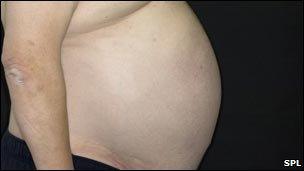Hospital obesity admissions increase by 30% in a year
- Published

Experts say more cases of obesity should be treated
The number of people admitted to hospital in England for obesity-related reasons rose by more than 30% last year.
But NHS statistics also show the increase in obesity rates in adults seen in recent years may be flattening out.
Experts believe it is too early to say if rates of obesity are now decreasing.
The health watchdog NICE recently advised that more cases of serious obesity should be treated in hospital.
There has also been a change in the way hospital procedures are recorded, meaning more obesity-related operations make their way into the statistics.
The number of weight-loss hospital procedures (bariatric operations) carried out in England rose by 70%, from just over 4,200 in 2008/09 to just over 7,200 in 2009/10.
Eighty per cent of these operations were carried out on women, and more were carried out in the East Midlands and London than any other regions.
Downward trend?
The report by the NHS Information Centre, external estimates that between 2008 and 2009, the percentage of obese men fell from 24% to 22%, while in women the figure went from 25% to 24%.
The fall is not regarded as being statistically significant and more data from future years will be needed to see if a downward trend in obesity levels is developing.
NHS Information Centre chief executive Tim Straughan said the figures show the number of hospital admissions, procedures and prescriptions related to obesity are continuing to increase in England.
"Hospital admissions in the last financial year topped 10,000 for the first time, while bariatric procedures passed 7,000.
"This report brings together different strands of information to show how obesity impacts upon our society, both in the community and in our hospitals, and gives health professionals and policy makers a clearer picture of how this affects the health service and how it is changing over time."
A Department of Health spokesperson said the coalition government is bringing a new approach to tackling obesity, set out in a public health white paper published last year.
"It sets out our plans to introduce ring-fenced public health budgets and give local councils new powers to drive improvements. In addition, through our partnership agreements with the voluntary sector and industry, we have moved further, faster to ban trans fats, reduce salt and put calories on menus.
"And as part of Change4Life, we are encouraging people to make simple changes, such as eating more fruit and vegetables, cutting down on fatty foods and being more active."
But Tam Fry, spokesperson for the National Obesity Forum, said the government needs to sharpen its focus on obesity.
"This is the second year in succession that rates have risen by 30% and I would not be surprised if the figures for 2011/2 were similar. They will prove to those who wish to dismiss the severity of the obesity just how bad it is and the rise in bariatric surgery is particularly revealing.
"The present government cannot be held to account for obesity as it exists to-day, but it must held to account if its policies are not better focussed to tackle it from now on."
Beatrice Brooke, of the British Heart Foundation, said: "The huge increase in obesity-related hospital admissions, prescriptions and surgery shows just how vital it is to prevent obesity in the first place."
- Published3 February 2011
- Published3 February 2011